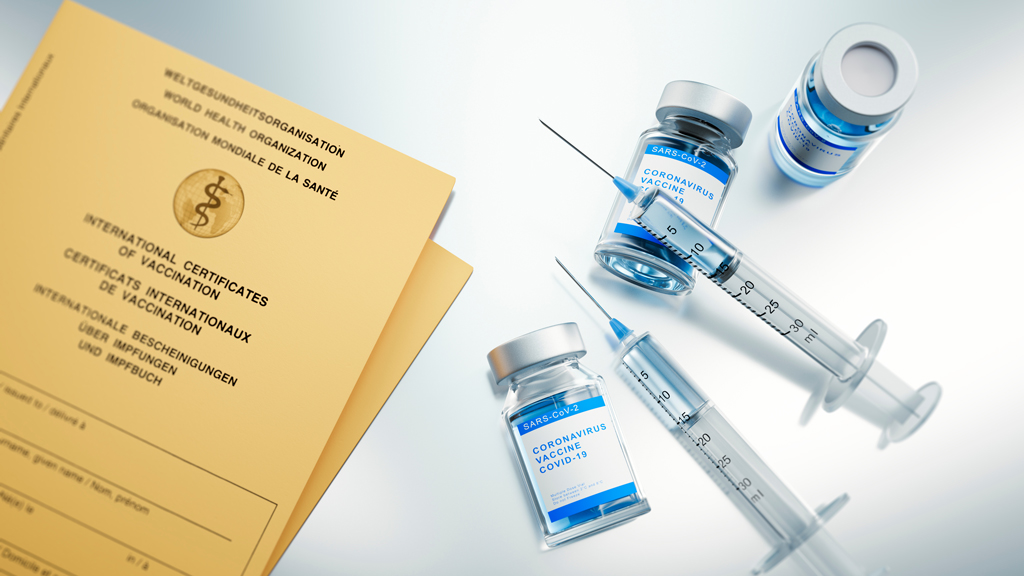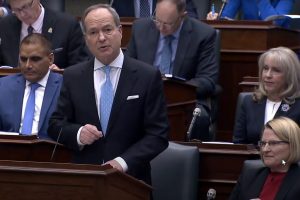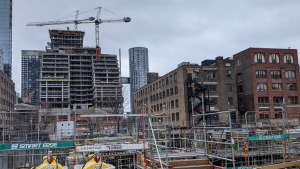TORONTO — The Ontario government has unveiled a plan to require people to be fully vaccinated and provide proof of their vaccination status to access certain businesses and settings starting Sept. 22.
The government said the plan focuses on higher-risk indoor public settings where face coverings cannot always be worn. Other indoor places of business considered less high-risk, such as professional and construction offices, will continue under the former policy.
Requiring proof of vaccination in the high-risk settings reduces risk and is an important step to encourage all eligible Ontario citizens to become fully vaccinated as the Delta variant threatens the province, Premier Doug Ford said during a Sept. 1 media presentation.
“As the world continues its fight against the Delta variant, our government will never waver in our commitment to do what’s necessary to keep people safe, protect our hospitals and minimize disruptions to businesses,” said Ford. “Based on the latest evidence and best advice, COVID-19 vaccine certificates give us the best chance to slow the spread of this virus while helping us to avoid further lockdowns.”
The policy was developed in consultation with Ontario’s chief officer of health. As of Sept. 22, citizens will need to be fully vaccinated (two doses plus 14 days) and provide their proof of vaccination along with photo ID to access certain public settings and facilities.
The new policy includes:
- restaurants and bars (excluding outdoor patios, as well as delivery and takeout);
- nightclubs including outdoor areas of the facility;
- meeting and event spaces, such as banquet halls and conference centres;
- facilities used for sports and fitness activities and personal fitness training, such as gyms,
- fitness and recreational facilities, with the exception of youth recreational sport;
- sporting events;
- casinos, bingo halls and gaming establishments;
- 演唱会、音乐节、剧院d cinemas;
- strip clubs, bathhouses and sex clubs; and
- racing venues, such as horse racing.
The certificate will consist of the paper or PDF vaccine receipt citizens received when vaccinated along with another piece of photo identification, such as a driver’s licence or health card. This is similar to the initial implementation approach announced in British Columbia.
The mandatory requirements would not apply to outdoor settings where the risk of transmission is lower, including patios, with the exception of outdoor nightclub spaces. In addition, the requirements will not apply to settings where people receive medical care, food from grocery stores and medical supplies. Indoor masking policies will continue to remain in place.
Individuals who cannot receive the vaccine due to medical exemptions will be permitted entry with a doctor’s note until recognized medical exemptions can be integrated as part of a digital vaccine certificate. Children who are 11 years of age and younger and unable to be vaccinated will also be exempt.
For the period between Sept. 22 and Oct. 12, people attending wedding or funeral receptions at meeting or event spaces will be able to provide a negative rapid antigen COVID-19 test from no more than 48 hours before the event as an alternative to proof of vaccination. The tests would have to be privately purchased.
声明说,安大略将开发额外的tools in the coming weeks, including establishing alternative protocols for people with no email, health card or ID. The government will work to support implementation of vaccine certificates for Indigenous communities whether or not they have opted to enter their data into COVaxON, while maintaining Indigenous data governance, control, access and possession principles. Ontario will also introduce an enhanced digital vaccine receipt that features a QR code.
In addition, the province will launch a new app to make it easier for businesses and organizations to verify that a digital vaccine receipt is valid. Individuals can provide proof of immunization by downloading or printing their vaccine receipt from the provincial booking portal, or by calling the Provincial Vaccine Booking Line at 1-833-943-3900.
Ontarians who received their first or second dose of the COVID-19 vaccine out of province should contact their local public health unit to record their information and receive proper documentation.
To protect vulnerable patients and staff in settings where the risk of contracting and transmitting COVID-19 and the Delta variant is higher, the government, in consultation with the chief medical officer of health, is pausing the province’s exit from the Roadmap to Reopen and providing third doses of the COVID-19 vaccine to vulnerable populations.
The medical officer of health is also making COVID-19 vaccination policies mandatory in higher-risk settings









Recent Comments
comments for this post are closed